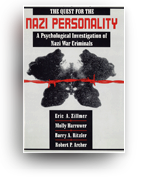 |

Open to Interpretation…The Art and Science of Inkblots
Ashland, OH: Hogrefe, 2009
[more]
............................................
Principles of Neuropsychology
Belmont, CA: Wadsworth, 2008
[more]
............................................
Military Psychology: Clinical and Operational Applications
New York, NY: Guilford, 2006
[more]
............................................
The Quest for
the Nazi Personality
Hillsdale, NJ: Lawrence Erlbaum Associates, 1995
............................................
Neuropsychological Assessment and Intervention
Springfield, IL: Charles Thomas, 1992
[more]
|
 |
|
 |
 |
 |
THE QUEST FOR THE NAZI PERSONALITY:
A Psychological Investigation of Nazi War Criminals

Eric A. Zillmer, Molly Harrower, Barry A. Ritzler, & Robert P. Archer
Hillsdale, NJ: Lawrence Erlbaum Associates, 1995
|

What's the history of the interpretations of the Nazi Rorschach data? Has there been or is there now consensus among Rorschach experts about what kind of personality they showed?
That's a complicated question. There is no overwhelming uniform pathology in these records, with the exception of Rudolf Hess. In fact one of the prosecutors, Taylor who wrote The anatomy of the Nuremberg trials in 1992, felt that Hess shouldn't have been tried because of his mental state. The other exception might be Julius Streicher, the editor of Der Stürmer, who showed evidence of mental illness. By the way, my intention and ultimate failure to search for the Nazi personality was not to excuse what they did; I was just trying to understand why they did what they did.
Next Question...
|
|